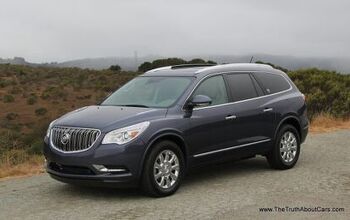Class Action Lawsuit Targets GM "One Percent Doctrine"
GM recently settled an SEC investigation into its accounting practices. The automaker didn’t admit guilt or pay a fine, but it was confirmation– if confirmation was needed– that GM under Rick Wagoner has played fast and loose with the numbers. And when you’re as big as GM, little “tweaks” here and there can have a significant effect on the bottom line. In fact, I’d go as far as to say that history will eventually regard Wagoner as an accountant gone wrong: a GM lifer whose only genius lay in his ability to make numbers his bitch. Until he couldn’t. As part of that legacy, this [press release after the jump]. I’m no lawyer, but it appears that GM violated rules regarding mark-ups to dealers and, thus, customers. And once again, the “winners” of a legal action against an automaker get discounts on the offending company’s products, while the lawyers get millions of dollars. Not to coin a phrase, but how great is that?
“A notification program began today, as ordered by the Court of Common Pleas of Lancaster County, to alert those who bought certain new GM vehicles from Pennsylvania GM Dealers about a proposed class action settlement involving GM’s marketing programs.
The case is about GM adding 1% of the Manufacturer’s Suggested Retail Price (“MSRP”) to the invoice for certain new vehicles it sold to its dealers, as part of their “Marketing Initiative” programs. The lawsuit claims that GM required dealers to use the 1% amount for advertising, and that this violated Pennsylvania law. The lawsuit also claims that dealers passed this amount on to consumers when they purchased vehicles. GM denies any wrongdoing, and states that the 1% was a legal, wholesale price increase to its dealers, and that dealers did not necessarily pass on the 1% amount to each purchaser.
The settlement includes a group of people, called a “Class” or “Class Members,” who bought a new vehicle at retail in Pennsylvania from a franchised dealer that was made or distributed by GM. The GM dealer must have purchased the new vehicle on or before March 31, 1999, but after (a) September 1, 1998 for Chevrolet or GMC Truck vehicles; (b) July 1, 1989 for Cadillac or Oldsmobile vehicles; (c) July 1, 1990 for Pontiac vehicles; and (d) August 1, 1990 for Buick vehicles. The Class does not include anyone who purchased vehicles under the GM Employee Purchase Plans, GM qualified fleet purchasers, government entities, attorneys of record in this case, lessees, or anyone who previously requested exclusion from the Class.
The settlement provides rebates certificates worth up to $200 toward the purchase or lease of a new GM vehicle. Certificates will be valid for three years after the settlement receives final court approval. Up to two certificates can be used toward the purchase of one vehicle.
Notices informing Class Members about their legal rights are scheduled to appear in Pennsylvania newspapers and magazines leading up to a hearing on April 28, 2009, when the Court will decide whether to grant final approval to the settlement.
The Court has appointed Joseph F. Roda and Michele S. Burkholder, RodaNast, P.C. of Lancaster, Pennsylvania, to represent the Class as “Class Counsel.”
Those affected by the settlement can send in a claim form to ask for a rebate certificate, object to the settlement, or ask to appear and speak at the fairness hearing. Claim forms must be postmarked no later than June 15, 2009. The deadline to object to the settlement or request to appear and speak at the hearing is March 16, 2009.
A toll-free number, 1-888-866-1738, has been established in this case (called Soders v. General Motors Corp., No. CI-00-04255), along with a website, www.onepercentcase.com, where notices, claim forms, the settlement agreement, and the Court’s preliminary approval order may be obtained. Those affected may also write to Soders v. General Motors Corp., PO Box 91196, Seattle, WA 98111-9296 for more information.
More by Robert Farago
Latest Car Reviews
Read moreLatest Product Reviews
Read moreRecent Comments
- Formula m For the gas versions I like the Honda CRV. Haven’t driven the hybrids yet.
- SCE to AUX All that lift makes for an easy rollover of your $70k truck.
- SCE to AUX My son cross-shopped the RAV4 and Model Y, then bought the Y. To their surprise, they hated the RAV4.
- SCE to AUX I'm already driving the cheap EV (19 Ioniq EV).$30k MSRP in late 2018, $23k after subsidy at lease (no tax hassle)$549/year insurance$40 in electricity to drive 1000 miles/month66k miles, no range lossAffordable 16" tiresVirtually no maintenance expensesHyundai (for example) has dramatically cut prices on their EVs, so you can get a 361-mile Ioniq 6 in the high 30s right now.But ask me if I'd go to the Subaru brand if one was affordable, and the answer is no.
- David Murilee Martin, These Toyota Vans were absolute garbage. As the labor even basic service cost 400% as much as servicing a VW Vanagon or American minivan. A skilled Toyota tech would take about 2.5 hours just to change the air cleaner. Also they also broke often, as they overheated and warped the engine and boiled the automatic transmission...


































Comments
Join the conversation
Can you re-explain what was done and how that hurt consumers? If I read this correctly... GM raised the price of the car they sold to dealers by 1%. GM demanded that the dealers increasing their advertising budget by exactly the dollar amount that 1% price increase came to for all the cars the dealer purchased. The problem is that GM is prohibited by PA Franchise Law from telling a dealer how to spend their advertising dollars. I don't get it. Why didn't GM just raise their wholesale price and use that extra revenue to buy ads themselves? Or they could have given dealers advertising grants. If GM wanted to increase advertising, then this is was very convoluted way to do it. And how did this impact the end consumer? If the dealer's expenses go up, then they can either raise prices, or trim profits. Then if the retail price is too high, the customer can take their business elsewhere, or not buy the car. I must be missing something. It doesn't make any sense to me.
Going forward in to our new era of "Change" let's consider doing away with this particular sacred cow...the class action lawsuit. What a rip to the general public!